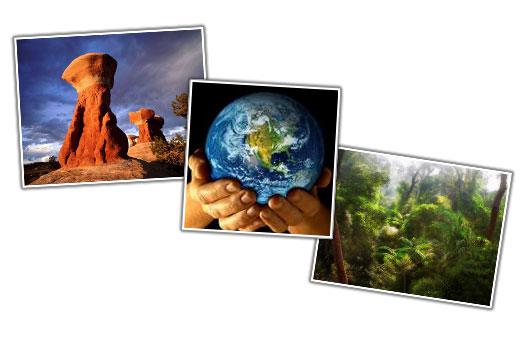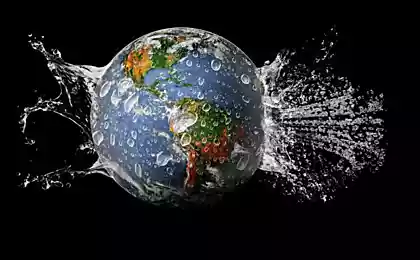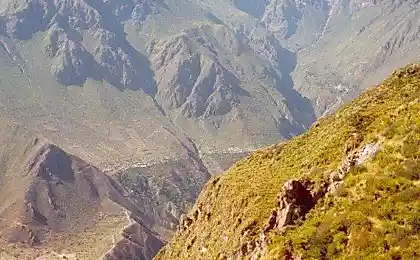1365
Facts About Earth

... The length of the orbit at which the Earth moves around the Sun in 23 thousand times greater than the length of the Earth's equator.
... The largest area of the world - Asia (43, 5 million square kilometers), the smaller - Australia (Oceania with about 9 million square kilometers).
... In the Valley of Death, driest and hottest places on earth, lived for more than 15 species of birds, 40 species of mammals, 44 species of reptiles, 12 species of amphibians, 13 species of fish and 545 species of plants.
... Land Kimolos island, in a group of Cyclades islands in the Aegean Sea, is composed of a soap of fatty substance that residents of the island since ancient times used as a soap. They bathe him and wash clothes. When the rain comes, the island is covered with soap suds.
... The city Taghaza (sugar) found the house with walls made of rock salt. This is one of the driest places on Earth, and why homes are not in danger of mud from the rain.
... Village Saint-Michel in the north-western France twice a day and sometimes twice island peninsula. A peculiar phenomenon is due to the strong tides in this part of the Atlantic Ocean.
... Between the islands of Bali and Lombok, just 15 miles away. The maximum depth of the strait separating - 341 meters. However, despite the close proximity, these two islands are living completely different four-legged animals, freshwater fish and even birds. Wittily one scholar, these islands are characterized by their fauna more than England from Japan.
Faunal boundary, passing between the islands of Bali and Lombok called the Wallace Line after the famous English naturalist, who discovered it in 1892. This boundary separates the fauna of the Indian Ocean and Asia from the animal world of the Australian faunal region.
... On the tiny island of El Alakran (near the northern coast of Chile) There are more than one million cormorants, gulls. Huge flocks are worn constantly over the sea, drowning his cry roar of ocean surf. El Alakran - one of the largest "rookeries" on earth.
... The capital of Peru - Lima is located near the ocean, but in the arid desert. The city hardly knows rains. His houses are no gutters, and residents - raincoats. The annual sediment layer in Lima - 37 mm.
... On the island of Kunashir, closes from the south Greater Kurile chain, nature has created a unique structure made of stone, like a giant organ. Its hexagonal height of several tens of meters "pipe", huddled close to each other, formed a massive projection that impregnable cool cape looming over the Sea of Okhotsk. When the sea is raging storm, the howling of the wind in the crevices of these tubes resembles the sound body.
... The first atlas appeared in 150 AD. Its creator was the Greek scientist Ptolemy. Atlas printed in 1477 in Bologna (Italy).
... The biggest atlas stored in the German State Library in Berlin. It weighs about 250 kilograms and the size of 1, 70h2, 20 meters. This exhibit gives visitors a rare opportunity to see the library cartographic art of the XVII century.
... The first geographical globe is kept in the city of Nuremberg. It is made geographer M. Behaim in 1492
... Echo - a reflection of the wave of air. If the reflecting sound of rock is from us at a distance of less than 30 m, then there is no echo.
On the Rhine River has an area where the echo repeats the word twenty times.
In France, the city of Verdun are two towers at a distance of 60 m from each other, and if you stand between them and shout, we can hear the echoes of the words of twelve times.
... Celebrity Ear of Dionysius - carved into the rocks near Syracuse and really like the human ear is a giant grotto, where the echo reaches such force that the rustle broken at the entrance of the paper sheet is given to the depth of the cannon shot.
... Everyone knows what a mountain sickness: climb to the highest peaks accompanied by an increase in blood pressure. The only place on earth where this dependence is not observed - Northern Tien Shan. The inhabitants of his mountain pressure is lower than that of the inhabitants of the plains.
... In the Sahara, every year there is about 160 thousand mirages. They are stable and wandering, vertical and horizontal. Compiled even special cards caravan routes marked places usually seen mirages. These maps indicate where there are wells, oases, palm groves, mountain ranges ..
The victims most often mirages are the caravans in the desert Org al-Rawi. Before people "personally" at a distance of two to three kilometers oases appear to them in fact no less than seven hundred kilometers.
... Almost all of the islands in the Atlantic owe their origin to the volcanoes.
... Indonesian archipelago belongs to that part of the earth's crust, which is still in the making. Some islands are immersed in the depths of the sea, the other suddenly or gradually emerging from it. These phenomena are explained by frequent earthquakes, a large number of active volcanoes and the growth of coral reefs. Therefore, the map of Indonesia often have to be amended.
... The largest volcano in the world is on the Japanese island of Kiu-Shiu called Aso. The length of the crater of the volcano is 23 kilometers, the width of -14 km, depth - 500 meters.
... Volcano Izalco in the Republic of El Salvador erupts every 8 minutes and for two centuries its activities gave more than 12 million eruptions.
... At the end of the last century in the US Senate were heated debates on the question of where to build more profitable route of the Panama Canal. The fact that far from the place where it is supposed to dig the channel, there was a strong eruption of Momotombo (Nicaragua). In the same year in Nicaragua it has released a special stamp with the image of the eruption. Engineer Byuno Vavilla sent a copy of the mark to each senator. A small piece of paper had a stunning impact. Even the most ardent defenders of the old project surrendered their positions.
... Japan - the classic "country of earthquakes," On average, its territory takes three earthquakes a day "for breakfast, lunch and dinner" - as the Japanese say jokingly. Most of these notes only instruments.
... Among the many astronomical tables of Ulugbek great interest is the table of geographical coordinates of 683 different cities not only in Central Asia, but in Russia, Armenia, Iran, Iraq and even in Spain.
... The northernmost city in the world millionaire - St. Petersburg. Closest to the equator is Singapore.
... Most of the cities vysokoraspolozhenny-millionaires - Bogota, capital of Colombia, 2650 meters above sea level. Second place in this regard takes Mexico City (2200 meters).
... In nature, there are about 1330 species of water. They differ in the origin (rainwater, soil, fresh or long-lying snow, etc.), The number and nature of the substances dissolved in it.
... In cubic meters of sea water contained 1, 5 grams protein and many other nutrients. Uchenye.podschitali that the Atlantic Ocean "nutritionally" estimated at 20 thousand harvests collected annually throughout the land.
... If all the people ate and used as cattle feed plant resources of the seas and oceans, the food would be enough for 290 billion people.
... The average temperature of the surface waters of the world ocean is 17, 4 degrees, while the average temperature of the lower layer of air above the oceans is 14, 4 degrees.
Occupying nearly 3/4 of the earth's surface, the ocean is a powerful and permanent factor in heating the lower layers of the atmosphere and mitigate climate globe.
... Poets, painters, novelists have sung the ninth wave as the largest among the surging waves. But in fact there is no ninth shaft. This is easily seen, counting from the ship or from the shore the number of intermediate wave between the two largest. The biggest wave can be any.
But where did the name "The Ninth Wave"? It originated in the times of the ancient times of the mythological idea of the nine, as a sacred number.
... In the ancient Baltic Sea called Amber because of the abundance of it in amber.
... Researchers say the Caspian Sea, it was the sea about 70 names: Avar, Eastern, Chirkanskoe, Khvalynskoe and others, which reflect the history and geography of its coasts. The name of the Caspian Sea is connected with the name of the tribe Caspians who lived in ancient times on its banks.
... The greatest transparency have water of the Sargasso Sea, located in the western Atlantic Ocean.
... The number and value of the rivers flowing into the Atlantic Ocean, is much greater than the number and size of rivers flowing into the greatest of all oceans - the Pacific Ocean. This is explained by the fact that along the shores of the Pacific Ocean on a large stretch over high mountains. As a result, the Pacific Ocean absorbs water with only 20 percent of the land area, whereas the Atlantic and Arctic Oceans collect a water with 53 percent of the total land area of the globe.
... River flows annually carried into the seas and oceans 16 billion tons of solid materials in the form of stones, debris or various solutes. If all this is to plunge into boxcars, then the train, which is 30 times the Earth's equator opoyashet.
... Of the 70 rivers in Europe and Asia more than 1,000 kilometers in length 50 flows through the territory of the former Soviet Union.
... One side of the river Ural is in Europe, the other - in Asia.
... Siberian rivers into the Arctic Ocean bring as much heat as the burning would give 3 billion tons of fuel. If not for the river, the climate of the North would be more severe.
... Kosi River (India) every year, making its new direction, devastating in its motion large areas. Crops, villages, cattle - all sweeps it on its way. The river and its famous "carrying capacity": the total annual sediment load is a huge figure - 116 million cubic meters. Pebbles, sand and clay, which annually brings to the river valley from the mountains of the Himalayas, can be filled with 8 million freight cars!
... Narin almost as Volga reserves of water power. The power of the Volga (its hydropower) 6, 20 million kilowatts, and the strength of the Naryn - 5, 94 million kilowatts.
... In South America, in the Andes, at an altitude of 3812 meters is the largest alpine lake in the world - Titicaca.
... Lake Baikal can be filled with 94 water bodies such as the Sea of Azov.
... The most "dead" body of water is not the Dead Sea, and the Lake of Death in Sicily, on the banks of which there is no vegetation, and every living thing in the water it catches up with instant death. From the bottom of the lake beat two sources of highly concentrated acid, which poisons the water.
... The lake is filled with "ink" is, in Algeria, near Sidi Bel Abbes. The water of this lake can be written on paper. "Ink" fail not because their stock is constantly updated. The fact that this "natural inkpot" small flow two streams: one of them water rich in salts of iron, and the other - the humic substances; they and form a liquid-like artificial inks.
... In the mountains of Yugoslavia is a wonderful lake - Tsirknitskoe. The peculiarity of the lake is the disappearance of its water in summer and winter, the water is returned back to the spring and fall. The water goes away and comes back with the fish through the four holes in the bottom of the funnel and the banks. The disappearance of the water sometimes happens 3-4 times a year.
... Victoria Land (Antarctica) found the lake, where the water is 11 times saltier sea and can freeze only at -50 degrees C.
... Geysers - the hot springs of Kamchatka release day is the amount of heat, which is equivalent to 15 million cubic meters of gas.
... And the water can burn ... Near the village Kergalan in Azerbaijan there is a "fuel" water. It abounds in a small hole, forming a lively stream. It is necessary to bring a lighted match to the key, and the water turns blue flame. Scientists attribute this to the fact that along with the water from under the ground out a combustible gas - methane. It was he who lights a match.
... From the natural gas produced per year from a single gas well average performance, you can get as much artificial fur as a year can shear wool with almost 62 thousand sheep.
... The most common mineral on Earth is quartz.
... Precious stones amethyst and opal have the same chemical formula as river sand, and Ruby has a formula of white clay.
... A hundred years ago aluminum was extracted pounds a year, and one kilogram of it cost 500 rubles in gold, and from 1855 to 1899 - 45 years - in aluminum prices decreased 500 times. In 1900, the world has been produced 8000 tons of aluminum.
... Because oil can produce up to a million different chemical compounds, and from coal - "only" 400 thousand.
... In Greenland, we found a unique field of pure iron. This is due to the eruption: the ore with the magma passed through the formation of coal and recovered. It is very similar to the blast furnace!
... The atmosphere of the earth weighs 5 300 000 000 000 000 tons. If, for example, required to carry the goods, equal to the weight of the atmosphere, from Moscow to Leningrad, and if each train had 100 cars and goes all the way in 10 hours, you have to spend on transportation of cargo almost 4 billion. Years.
... Earth and air are inseparable. If the Earth's atmosphere does not move with the Earth, many travel would be very easy to make. It would be enough to rise above the earth's surface on a balloon and go down when you need a piece of land will be under the balloon.
... At the north pole is warmer than in the South. The North Pole is at sea level, the South - at a height of more than 3 kilometers away from the sea level. North Pole surrounded on all sides of the continent, which gives a lot of heat in the summer; to the North Pole is suitable branch of the warm Gulf Stream; The North Pole is sunlit almost Nadel longer than the South.
... In the Atacama Desert on the Pacific coast of America each year falls no more than 8 millimeters; because of the dryness of the bodies of dead animals out there to dry, and thirty years of not rot.
... Overcoming gravity, powerful thermal "machine", driven by the energy of the sun each year raises from the surface of the globe in the atmosphere of 511,000 cubic kilometers of water. 411,000 cubic kilometers rises from the surface of the ocean alone.
... The storm in Egypt happens only once in 200 years.
... Lightning benefit. In his "fast" flight they manage to snatch out of the air, millions of tonnes of nitrogen, "connect" and send it to the ground. This free manure enriches the soil in which grow cereals.
... Weathervane as suggested - one of the oldest meteorological instruments. Even two thousand years ago, the idea of the device, "wind direction" has been brought from the East to Europe, in ancient Japan and China had a weather vane, views of the dragon. In medieval European cities it became the custom to decorate steeples tallest buildings weather vane depicting a rooster. These devices are called "weather cock" as for variable winds often followed by a change of weather.
... Ancient masonry well, "predicting" the weather has on the Ustyurt plateau in Kazakhstan. Before the rain, fog or snow, he draws in the air and on a fine, dry sunny day, on the contrary, it pushes out. If at this moment to throw his hat into the well, it is not reaching the water, fly back.
Well-phenomenon dugout lined limestone slabs, it is a natural barometer Guryevsky shepherds. He regularly informs them of the approaching storm.
... More than half of the world's population has never seen snow, except in photographs.
... It turns out ice cold differently. There is a very cold ice, with temperatures around minus 60 degrees. This ice some Antarctic glaciers. Much warmer than the ice of Greenland glaciers. Its temperature is about -28 degrees. Very "warm ice" (with a temperature of about 0 degrees) are on the tops of the Alps and the Scandinavian mountains.
... One centimeter layer of packed snow in the winter gives 25-35 cubic meters of water per 1 ha.
... The amount of water, "canned" in the glaciers of the world, 50 times less than the whole mass of ocean water, and 7 times more land waters. If the glaciers completely melted, the sea level would rise by 800 meters.
... Two or three medium-sized iceberg contain a lot of water, equal to the annual flow of the Volga (Volga annual flow - 252 cubic kilometers).
... Spring moves at a speed of about 50 kilometers per day. This is determined by the observations of the inflorescence of individual plants.























